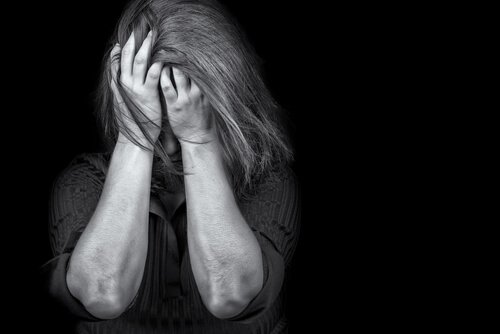Resistance Toward Emotional Healing

They say we all seek out our well-being. We all want to be happy. They say we do everything within our power to achieve it. If you’re going through a rough time and you’re asked about it, you’d surely say that you’d do anything to rid yourself of it.
However, psychoanalysis and psychologists have discovered that this is not quite true. It has been proven during therapy: patients sometimes resist getting better.
“And even the blindness of the blind man and his gingerly walk should attest to the power of the sun I look upon.”
-Nietzsche-
As part of a psychoanalytic process and a psychological therapy, resistance is expressed in different ways. There’s no time to go to sessions, you lose interest in the process, they excessively criticize the therapist or psychoanalyst…
Everything that stops or hinders the progress constitutes some form of resistance towards healing. Why would someone who’s suffering and has the opportunity to heal sabotage that opportunity?
The resistance
In reality, resistance suggests a struggle between the conscious desire to change and the unconscious forces that hinder this process. The root of the suffering lies within these unconscious forces.
Here’s the paradox: healing can pose a great problem for people. That’s the reason that almost everyone resists carrying out processes that truly draw us out from these great sufferings.
The cure is problematic due to many reasons, but let’s focus on just three:
- We fear not being able to face the pain.
- When you heal a great suffering, you also lose some benefits that come with it.
- It involves a great deal of guilt.

The fear of suffering even more
And if they ask you about your problems and conflicts, surely you’d make a list of general situations that make you upset: you’re not happy with your partner or your job, you don’t have good relationships with your family, you’re afraid of others’ opinions and things like that.
When we look into this type of situation in depth, we realize that it’s simply the tip of the iceberg for other more complex realities.
For example, it’s not that you’re not happy with your partner, but rather that you have the horrible fear of abandonment and that makes you a controlling person that causes problems. It’s not that you’re unhappy with your job, but rather that you fear your boss, and it’s impossible for you to reclaim your right to certain things.
Though we may not be conscious of it, we all know that there are hidden reasons behind our main problems. They are usually fears, guilt and desires that we don’t accept consciously.
That leads us to offer resistance when it comes to our healing. We don’t want to face these painful or disturbing realities, because we think that we won’t be able to handle them.
Secondary benefits of suffering
Despite all of the complications that it brings, suffering also has its benefits. In reality, it’s easier to repeat the grocery list of problems we have rather than invest a great amount of effort in analyzing and solving them. So maintaining our suffering allows us to save up energy.
From our suffering, we usually build a certain position towards life, which justifies our problems. For example, “I can’t find a better job because the economy is in a crisis, and I have to conform with what I have.”
With this being said, it’s no longer our responsibility. Therefore, we’re simply a victim of circumstance. We even get people to tell us “poor you,” and feel comforted by it.
Finally, and though it may seem strange, people tend to get attached to their problems. In fact, when we resolve a problem, we might even feel a sort of grief.

Guilt and punishment
Though they’ll never consciously admit it, some people are convinced that they deserve the suffering they experience. It’s not that they set out to suffer at will, but they avoid ridding themselves of that suffering, though they may have the opportunity to do so.
No therapy works for them. No psychologist, no psychoanalyst. No type of change shows any results. The only thing that works is their own suffering.
These people unconsciously feel that they should be punished. Why? Most of the time over childhood trauma, mothers or fathers that instilled an impossible demand, or something related.
The truth is that they adopt ideas and attitudes that keep them from getting the help they need. So they can fulfill the punishment they feel they deserve, deep down and without valid reasons.
We all have, to a greater or lesser extent, a combination of forms of resistance that keep us from healing our emotional pain. They are made more visible during a psychological or psychoanalytical consultation, but they’re also present during our everyday lives.
Overcoming this resistance is hard work, but at the same time, it represents the beginning of the end of our greatest sufferings.
They say we all seek out our well-being. We all want to be happy. They say we do everything within our power to achieve it. If you’re going through a rough time and you’re asked about it, you’d surely say that you’d do anything to rid yourself of it.
However, psychoanalysis and psychologists have discovered that this is not quite true. It has been proven during therapy: patients sometimes resist getting better.
“And even the blindness of the blind man and his gingerly walk should attest to the power of the sun I look upon.”
-Nietzsche-
As part of a psychoanalytic process and a psychological therapy, resistance is expressed in different ways. There’s no time to go to sessions, you lose interest in the process, they excessively criticize the therapist or psychoanalyst…
Everything that stops or hinders the progress constitutes some form of resistance towards healing. Why would someone who’s suffering and has the opportunity to heal sabotage that opportunity?
The resistance
In reality, resistance suggests a struggle between the conscious desire to change and the unconscious forces that hinder this process. The root of the suffering lies within these unconscious forces.
Here’s the paradox: healing can pose a great problem for people. That’s the reason that almost everyone resists carrying out processes that truly draw us out from these great sufferings.
The cure is problematic due to many reasons, but let’s focus on just three:
- We fear not being able to face the pain.
- When you heal a great suffering, you also lose some benefits that come with it.
- It involves a great deal of guilt.

The fear of suffering even more
And if they ask you about your problems and conflicts, surely you’d make a list of general situations that make you upset: you’re not happy with your partner or your job, you don’t have good relationships with your family, you’re afraid of others’ opinions and things like that.
When we look into this type of situation in depth, we realize that it’s simply the tip of the iceberg for other more complex realities.
For example, it’s not that you’re not happy with your partner, but rather that you have the horrible fear of abandonment and that makes you a controlling person that causes problems. It’s not that you’re unhappy with your job, but rather that you fear your boss, and it’s impossible for you to reclaim your right to certain things.
Though we may not be conscious of it, we all know that there are hidden reasons behind our main problems. They are usually fears, guilt and desires that we don’t accept consciously.
That leads us to offer resistance when it comes to our healing. We don’t want to face these painful or disturbing realities, because we think that we won’t be able to handle them.
Secondary benefits of suffering
Despite all of the complications that it brings, suffering also has its benefits. In reality, it’s easier to repeat the grocery list of problems we have rather than invest a great amount of effort in analyzing and solving them. So maintaining our suffering allows us to save up energy.
From our suffering, we usually build a certain position towards life, which justifies our problems. For example, “I can’t find a better job because the economy is in a crisis, and I have to conform with what I have.”
With this being said, it’s no longer our responsibility. Therefore, we’re simply a victim of circumstance. We even get people to tell us “poor you,” and feel comforted by it.
Finally, and though it may seem strange, people tend to get attached to their problems. In fact, when we resolve a problem, we might even feel a sort of grief.

Guilt and punishment
Though they’ll never consciously admit it, some people are convinced that they deserve the suffering they experience. It’s not that they set out to suffer at will, but they avoid ridding themselves of that suffering, though they may have the opportunity to do so.
No therapy works for them. No psychologist, no psychoanalyst. No type of change shows any results. The only thing that works is their own suffering.
These people unconsciously feel that they should be punished. Why? Most of the time over childhood trauma, mothers or fathers that instilled an impossible demand, or something related.
The truth is that they adopt ideas and attitudes that keep them from getting the help they need. So they can fulfill the punishment they feel they deserve, deep down and without valid reasons.
We all have, to a greater or lesser extent, a combination of forms of resistance that keep us from healing our emotional pain. They are made more visible during a psychological or psychoanalytical consultation, but they’re also present during our everyday lives.
Overcoming this resistance is hard work, but at the same time, it represents the beginning of the end of our greatest sufferings.
This text is provided for informational purposes only and does not replace consultation with a professional. If in doubt, consult your specialist.







